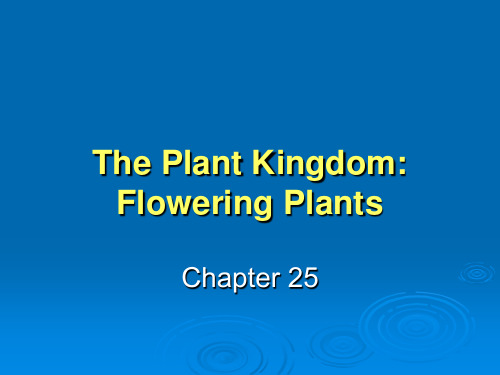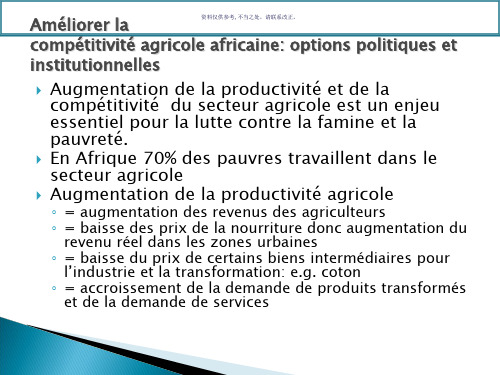植物学及园艺学英文版_botany_and_horticulture_(28)
- 格式:ppt
- 大小:2.50 MB
- 文档页数:21




植物学研究的英文综述Botany Study – A Literature Review.Botany, the scientific study of plants, encompasses a wide range of disciplines, including plant morphology, anatomy, physiology, genetics, ecology, and evolution. The field has a long and rich history, dating back to the earliest civilizations.Plant Morphology.Plant morphology is the study of the form and structure of plants. It includes the study of plant organs, such as roots, stems, leaves, flowers, and fruits. Plant morphology is important for understanding how plants grow and develop, and for identifying and classifying different plant species.Plant Anatomy.Plant anatomy is the study of the internal structure ofplants. It includes the study of plant tissues, such as xylem, phloem, and parenchyma. Plant anatomy is important for understanding how plants transport water and nutrients, and for providing support and protection.Plant Physiology.Plant physiology is the study of the functioning of plants. It includes the study of plant metabolism, transport, and growth. Plant physiology is important for understanding how plants respond to their environment and for developing new ways to improve crop yields.Plant Genetics.Plant genetics is the study of the inheritance oftraits in plants. It includes the study of genes, chromosomes, and DNA. Plant genetics is important for understanding how plants evolve and for developing new plant varieties with improved traits.Plant Ecology.Plant ecology is the study of the interactions between plants and their environment. It includes the study of plant communities, plant populations, and plant succession. Plant ecology is important for understanding how plants adapt to their environment and for managing plant communities for conservation and sustainable use.Plant Evolution.Plant evolution is the study of the evolutionaryhistory of plants. It includes the study of plant fossils, plant phylogenetics, and plant molecular biology. Plant evolution is important for understanding the diversity of plants and for understanding how plants have adapted to changing environmental conditions over time.Conclusion.Botany is a vast and complex field of study. It encompasses a wide range of disciplines, each of which contributes to our understanding of plants. Botany isessential for understanding the natural world and for developing new ways to use plants to meet human needs.植物学研究——文献综述。


horticulture. The knowledge gained from studying plants has broad applications, from improving crop yields and fighting plant diseases to developing new pharmaceuticals and understanding the impacts of climate change on plant species.
植物学还与其他科学学科密切相关,包括生态学、环境科学、农业和园艺学。
通过研究植物所获得的知识有广泛的应用,从提高作物产量和 bek闄哽īf.u软鹆诘淖稹⒋忻匚辰裣等┲
Overall, botany is a crucial field of study that has a significant impact on our lives. By understanding plants and their interactions with the environment, we can work towards a more sustainable future for our planet.
总的来说,植物学是一个重要的研究领域,对我们的生活产生了深远的影响。
通过了解植物及其与环境的相互作用,我们可以为地球的可持续发展努力工作。
关于植物学Botany
植物学,植物的研究中,占据了在人类知识的历史中特殊的地位。
对于几千年,这是认识的领域之一是人类有什么比模糊的见解更多。
这是不可能知道今天正是我们石器时代的祖先们对植物的认识,但我们可以观察到形成前工业社会仍然存在的植物,并详细了解他们的属性必须是非常古老的。
这是合乎逻辑的。
植物是食物甚至其他植物为万物金字塔的基础。
他们一直是非常重要的,不仅在食品的人的福利,而且在衣物,武器,工具,染料,药品,住房,以及许许多多其他的用途。
部落生活在亚马逊丛林中能够辨识几百种植物并知道每一种的许多特性。
对他们来说,植物学,因此,没有名称,并且可能甚至不作为“知识”在所有的特殊分支承认。
不幸的是,我们变得更加工业化距离越远,我们从与植物直接接触,和不太明显,我们的植物学知识的增长。
然而每个人在不知不觉中令人惊异的植物知识量,很少人会认不出玫瑰,苹果或兰花。
当我们的新石器时代的祖先,生活在中东的大约1万年前,发现某些草可收获丰富,它们的种子播种下一季产量中的第一个植物和人类的新的协会采取了重大步骤。
谷子被发现并从中流过的奇迹农业:种植作物。
从此,人类将越来越多地从一些植物控制生产生活,而不是一点点小这里一点,那里获取那些长野生和数以万计的经验和多年积累的许多知
识亲密品种与野生植株开始消失了。
英语作文:植物学BotanyBotany, the study of plants, occupies humans had anything more than the vaguest of insights. It is impossible to know today just what our Stone Age ancestors knew about plants, but form what we can observe of pre-industrial societies that still exist a detailed learning of plants and their properties must be extremely ancient. This is logical. Plants are the basis of the food pyramid for all living things even for other plants. They have always been enormously important to the welfare of people not only for food, but also for clothing, weapons, tools, dyes, medicines, shelter, and a great many other purposes. Tribes living today in the jungles of the Amazon recognize literally hundreds of plants and know many properties of each. T o them, botany, as such, has no name and is probably not even recognized as a special branch of " knowledge" at all.Unfortunately, the more industrialized we become the farther away we move from direct contact with plants, and the less distinct our knowledge of botany grows. Yet everyone comes unconsciously on an amazing amount of botanical knowledge, and few people will fail to recognize a rose, an apple, or an orchid. When our Neolithic ancestors, living in the Middle East about 10,000 years ago, discovered that certain grasses could be harvested and their seeds planted for richer yields the next season the first great step in a new association of plants and humans was taken. Grains were discovered and from them flowed the marvel of agriculture: cultivated crops. From then on, humans would increasingly take their living from the controlled production of a few plants, rather than getting a little here and a little there from many varieties that grew wild- and theaccumulated knowledge of tens of thousands of years of experience and intimacy with plants in the wild would begin to fade away.。